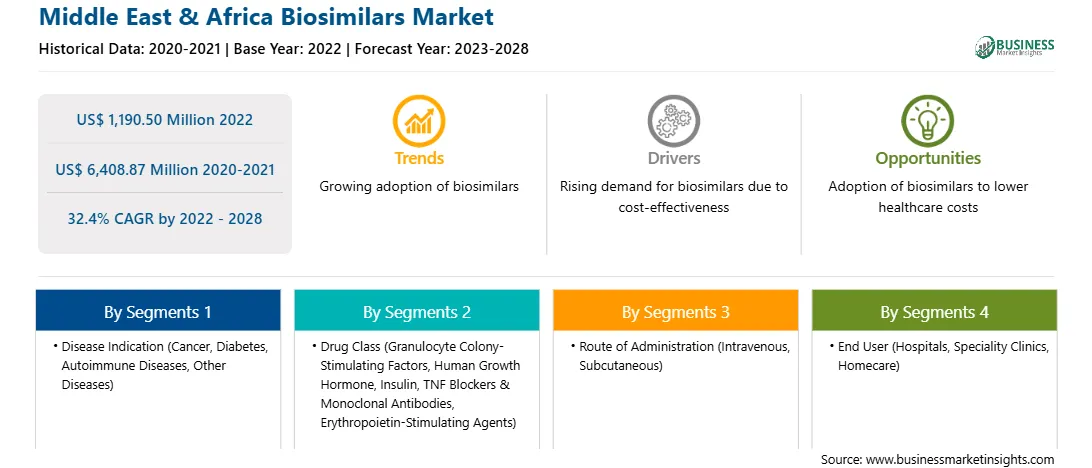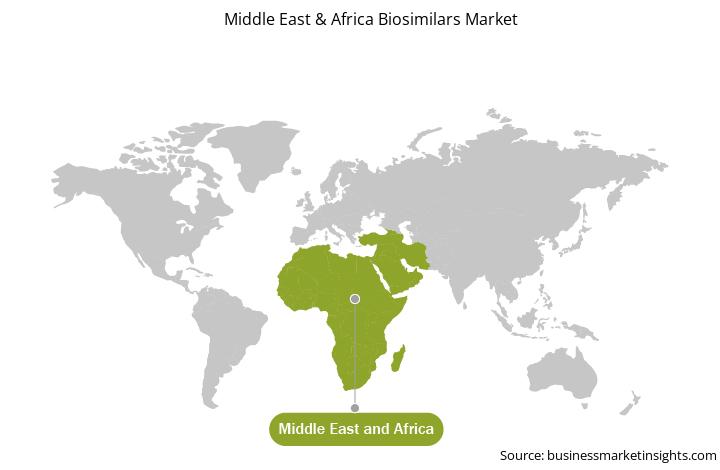The Middle East & Africa biosimilars market is expected to grow from US$ 1,190.50 million in 2022 to US$ 6,408.87 million by 2028. It is estimated to grow at a CAGR of 32.4% from 2022 to 2028.
Collaborations for Biosimilars and Clinical Trials is Driving Middle East & Africa Biosimilars Market
Joint ventures and other collaboration models will help biosimilar medicine manufacturers maintain a competitive edge over rivals in the market in the coming years. By collaborating with other companies planning to research, launch, and market biosimilar drugs, biosimilar manufacturers can develop their products rapidly and launch products effectively in a way that overcomes patent risks and gains clinician and patient confidence in the product. Product development can be expedited by gaining local and foreign expertise, development platform access, and research and clinical trial funding. Collaborating with a bigger biopharmaceutical manufacturer allows access to established manufacturing facilities. The collaboration can be done for outsourcing activities such as cell line development, biologics and biosimilar manufacturing, process scaling, and any required technology transfer. There are long-term benefits from collaborations. They can make it easy to tender for future biosimilar production projects within the country and offer early and efficient product development and market penetration. The immense potential of the biosimilars market has led to many recent, high-profile collaborations. Thus, collaborations of manufacturers for biosimilar production and clinical trials will be the key trend in the biosimilar market during the forecast period.
Middle East & Africa Biosimilars Market Overview
The Middle East and Africa biosimilar market is segmented into the Saudi Arabia, South Africa, UAE, and Rest of Middle East and Africa. The market growth in this region is attributed due to increasing prevalence of chronic disease, key initiatives by government, and increasing product development are driving the growth of biosimilar market.
According to the International Society for Pharmacoeconomics and Outcomes Research (ISPOR), in 2020, cardiovascular disease is the leading cause of deaths in Saudi Arabia which accounts for 45.7% of all death cases. Further, diabetes is growing in Saudi Arabia due to major lifestyle changes with unhealthy eating habits and sedentary lifestyle. According to IDF, in 2021, the frequency rate of diabetes in Saudi Arabia ranged from 8% to 22%. The major factors for diabetes are obesity, unhealthy lifestyle, increased life expectancy, increased healthcare expenditures, and genetic susceptibility. According to a nationwide survey, in 2022, Saudi Arabia had 5.5% of cardiovascular diseases prevalence. Thus, increasing cardiovascular diseases due to rising diabetes condition in Saudi Arabia is driving the growth of biosimilar market.
Furthermore, the increasing biosimilar product approval in Saudi Arabia is boosting the growth of biosimilar market in Saudi Arabia. For instance, the Saudi Food and Drug Authority (SFDA) has approved Remsima for use in rheumatology indications which is a biosimilar of infliximab manufactured by Celltrion and licensed under a local company, Jazeera Pharmaceutical Industries. Thus, growing chronic diseases conditions and product initiative by key players are driving the growth of biosimilar market in Saudi Arabia
Middle East & Africa Biosimilars Market Revenue and Forecast to 2028 (US$ Million)
Strategic insights for the Middle East & Africa Biosimilars provides data-driven analysis of the industry landscape, including current trends, key players, and regional nuances. These insights offer actionable recommendations, enabling readers to differentiate themselves from competitors by identifying untapped segments or developing unique value propositions. Leveraging data analytics, these insights help industry players anticipate the market shifts, whether investors, manufacturers, or other stakeholders. A future-oriented perspective is essential, helping stakeholders anticipate market shifts and position themselves for long-term success in this dynamic region. Ultimately, effective strategic insights empower readers to make informed decisions that drive profitability and achieve their business objectives within the market. The geographic scope of the Middle East & Africa Biosimilars refers to the specific areas in which a business operates and competes. Understanding local distinctions, such as diverse consumer preferences (e.g., demand for specific plug types or battery backup durations), varying economic conditions, and regulatory environments, is crucial for tailoring strategies to specific markets. Businesses can expand their reach by identifying underserved areas or adapting their offerings to meet local demands. A clear market focus allows for more effective resource allocation, targeted marketing campaigns, and better positioning against local competitors, ultimately driving growth in those targeted areas.Middle East & Africa Biosimilars Strategic Insights

Middle East & Africa Biosimilars Report Scope
Report Attribute
Details
Market size in 2022
US$ 1,190.50 Million
Market Size by 2028
US$ 6,408.87 Million
Global CAGR (2022 - 2028)
32.4%
Historical Data
2020-2021
Forecast period
2023-2028
Segments Covered
By Disease Indication
By Drug Class
By Route of Administration
By End User
Regions and Countries Covered
Middle East and Africa
Market leaders and key company profiles
Middle East & Africa Biosimilars Regional Insights

Middle East & Africa Biosimilars Market Segmentation
The Middle East & Africa biosimilars market is segmented into disease indication, drug class, route of administration, end user, and country.
Based on disease indication, the biosimilars market is segmented into cancer, diabetes, autoimmune diseases, and other disease indications. The cancer segment held the largest market share in 2022.
The biosimilars market, based on drug class, is segmented into granulocyte colony-stimulating stimulating factors, human growth hormone, insulin, TNF blockers & monoclonal antibodies, erythropoietin-stimulating stimulating agents, and others. The granulocyte colony-stimulating factors segment accounted for the largest share of the market in 2022.
Based on route of administration, the biosimilar market is segmented into intravenous, subcutaneous, and others. The intravenous segment accounted for the largest share of the market in 2022.
The biosimilars market, based on end user, is segmented into hospitals, specialty clinics, homecare, and others. The hospitals segment accounted for the largest share of the market in 2022.
Based on country, the Middle East & Africa biosimilars market is segmented into Saudi Arabia, South Africa, the UAE, and the Rest of Middle East & Africa. Saudi Arabia dominated the market in 2022.
Amgen Inc; Sanofi SA; Biocon Ltd; Eli Lilly and Co; Sandoz AG; Teva Pharmaceutical Industries Ltd; Pfizer Inc; and Dr. Reddy's Laboratories Ltd are the leading companies operating in the Middle East & Africa biosimilars market.
The Middle East & Africa Biosimilars Market is valued at US$ 1,190.50 Million in 2022, it is projected to reach US$ 6,408.87 Million by 2028.
As per our report Middle East & Africa Biosimilars Market, the market size is valued at US$ 1,190.50 Million in 2022, projecting it to reach US$ 6,408.87 Million by 2028. This translates to a CAGR of approximately 32.4% during the forecast period.
The Middle East & Africa Biosimilars Market report typically cover these key segments-
The historic period, base year, and forecast period can vary slightly depending on the specific market research report. However, for the Middle East & Africa Biosimilars Market report:
The Middle East & Africa Biosimilars Market is populated by several key players, each contributing to its growth and innovation. Some of the major players include:
The Middle East & Africa Biosimilars Market report is valuable for diverse stakeholders, including:
Essentially, anyone involved in or considering involvement in the Middle East & Africa Biosimilars Market value chain can benefit from the information contained in a comprehensive market report.